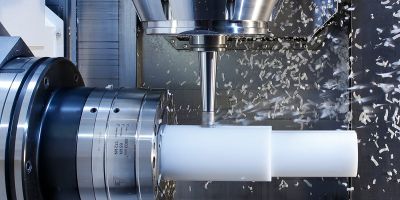Milled parts
Pump housing made of PP | Application: Handling of special media
Milled parts from plastic
In our milling production area, we work with state-of-the-art machining centers that have been specially optimized for plastics machining. For milled parts, too, it is important to take certain plastic-specific parameters into account as early as the design and development stage. As a development partner in plastics technology, we support our customers in this process with advice and assistance.
You are currently viewing a placeholder content from Youtube. To access the actual content, click the button below. Please note that doing so will share data with third-party providers.
More InformationSpecial features of plastic milled parts
In the milling process, unlike other manufacturing processes, the workpiece does not rotate and the machining is performed by driven tools. Our machine park is equipped with 5-axis CNC machines, on which complex precision parts are manufactured. We manufacture essential large plastic parts on portal milling machines up to a size of 2000×2000 mm.
Tool selection is essential for plastic CNC machines
Most milling tools, are designed for use in metal machining, but are not optimal when milling plastics. At Hänssler, we use essential tool profiles to achieve better surface qualities and exact tolerances even when machining high-performance plastics.

Production of milled parts from plastic plates
Clamping of semi-finished plastic products
Due to the lower stiffness and higher elasticity of plastics, a number of things must be taken into account when clamping the plastic blank. If clamping forces are too high, the plastic part will already be deformed during processing and tolerances cannot be maintained. Through innovative solutions, we clamp standard or high-performance plastic parts almost tension-free and achieve the highest precision in tough conditions.
We clamp very large plastic blanks up to 2×2 meters, mostly in the form of plastic sheets, completely tension-free using vacuum clamping devices.
Milled parts from standard plastics to high-tech materials from plastics technology
As a specialized service provider and development partner for plastic parts, we manufacture prototypes and series parts from a wide range of engineering plastics. In this context, the selection of the right plastic is crucial in order to be able to meet the requirements in the best possible way. We support our customers in selecting the right material through our technical team at the location in Mannheim.
The following factors are essential for the selection:

Production of milled parts from PTFE
Service temperature of the milled part
The service temperature depends on the type of plastic and can play an important role at high temperatures as well as at very low temperatures. We offer a variety of high-temperature plastics that are suitable for the most extreme conditions. However, for some types of plastics, you need to make the right choice even at low temperatures. For example, PP plastic should not be used at minus temperatures because it would become very brittle.
Static load on the plastic parts
If plastic components are subjected to static loads over a longer period of time, they tend to “creep”. On the one hand, this can be minimized by the type of plastic, on the other hand, the effect can be minimized by the use of reinforcements. We offer the entire range of reinforced materials, most of which we also have in stock.
Dynamic load of the milled plastic part
The fatigue strength of plastics is significantly increased with the use of high-performance plastics such as PEEK. These essential materials can also be reinforced with glass fibers and carbon fibers in various degrees of filling.
Conformities and approvals for special plastics
Conformities and approvals are playing an increasingly important role in order to be able to use the plastic part in certain industries at all. There are a large number of laws and regulations that are constantly changing. For this reason, we have trained a material compliance officer whose know-how our customers are happy to make use of.
Chemical resistance of the plastic
If chemicals are used, it must be checked which plastic is compatible with the contact. There are essential groups of plastics that have excellent properties under special operating conditions with aggressive media. Examples of these are PTFE, PP and PPS, which are clearly superior to metal parts in many applications.

Production of milled parts from PETG
Rubbing and Friction
When it comes to minimizing friction, the use of plastics is the first choice. Many plastics offer an essential low coefficient of friction and can be further improved by additives such as solid film lubricants.

Deflection gear made of PEEK | Application: Weight reduction in Formula Student racing car



